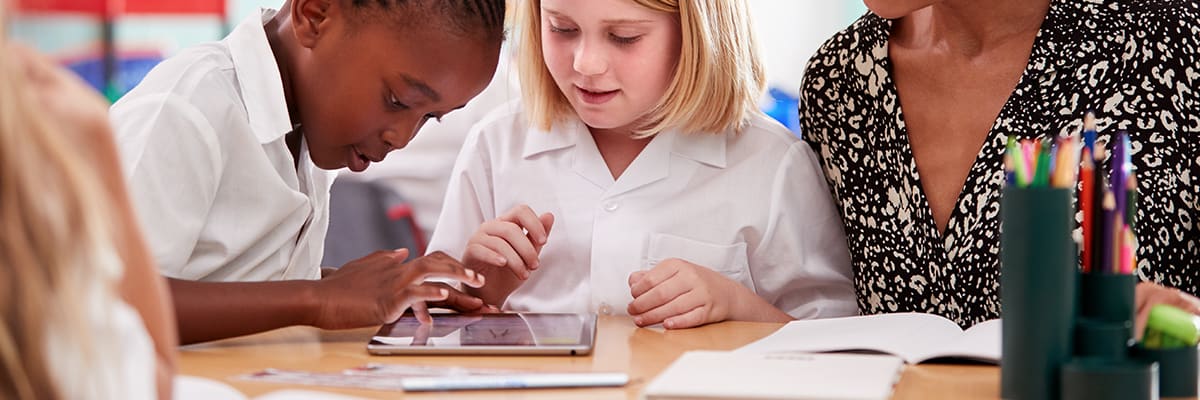
Return navigate_next
Virtual School: What Is the Best Tablet for Education?
August 26, 2020 *
With the COVID-19 pandemic shutting down in-person instruction in many areas, some parents are wondering how to help their children succeed with virtual learning. One of the most crucial aspects of this conversation is making sure each child has a device that enables them to see and hear their teachers and the digital content the teacher shares.
But families rarely have the budget to buy a high-end laptop for every kid. Many parents are looking for lower-cost ways to make virtual learning work, including using tablets instead of laptops. There’s plenty of research that dives into the ways tablets could transform education, but could they be right for virtual school, right now?
If you have questions about using tablets for virtual school, Upsie is here with the answers you’re looking for.
Can You Do Online School on a Tablet?
The answer in most cases is “yes.” But every school district, college and university is different, so make sure you know what the expectations are before you purchase.
Most online school is being handled via widely available apps like Zoom or Microsoft Teams, and just about any decently equipped tablet will be able to run those apps with ease.
But be aware: some schools are funneling their e-learning through their LMS (learning management system). All the good LMS systems are built with responsive websites that work perfectly on tablets. But we can’t speak for everyone. Contact your school’s office or technology liaison to find out any system requirements that may be in place.

If your student is in middle or high school and plans to type notes during lecture classes, a tablet might not be the best choice. But in most other cases, a tablet will work just fine.
For more on the topic of whether a tablet or a laptop is best for your child, check out Tablet vs. Laptop: What’s the Best Choice for Buyers? for additional details.
Which Tablet Is Best for Online Classes?
Generally, any tablet with sufficient processing power will work. Any iPad manufactured in the last 3 or so years will work great. Top-shelf Android tablets like the (non-budget) Galaxy line will work well, too. And anything in Microsoft’s Surface line will be more than sufficient (maybe even overkill) for the average student.
We don’t generally recommend Amazon tablets for online school. Amazon tablets are designed for consuming content rather than doing work. Their processors are sufficient for their intended uses, but perhaps not for the needs of school. Also, the Amazon app store is limited, making compatibility a question.
That said, if you buy the latest model and it does everything your child needs, Amazon could still be a strong choice. TechRadar actually recommends the Fire 7 based on durability and price.
You also need to stay away from those dirt-cheap budget Android tablets. They are rarely worth the money, and they certainly aren’t if your objective is online learning.

What Tablets Are Used in Schools?
Most schools that are rolling out tablets far and wide are partnering with a top-tier manufacturer, like Apple, Dell, or Samsung. Districts need the devices to all be the same so they can image them easily. But that doesn’t mean you have to buy the same exact devices for home use.
What Are Tablets Best Used For?
The broader tech press asks this question regularly, because many power users don’t have a solid use case for a tablet. They need a pro-level laptop for heavy processing power, and they already have a large, modern smartphone for quick tasks. The tablet, for those folks, falls somewhere in between and doesn’t get used for much besides travel.
But the picture is different for families. Not every child in the home needs his or her own laptop, at least not until those kids are older. Mini tablets are the perfect size for kids to play games and watch content on, and they tend to be cheaper than laptops, too.
How Do I Secure My Tablet?
Tablets from the major manufacturers come with some sort of parental controls. Each OS (iOS, Android, FireOS) is different. But whichever you choose, you can secure your kids’ tablets so they can access only what you want them using.

What Is the Best Way to Protect My Tablet?
The best way to protect your tablet is through a tablet extended warranty with accident protection. Whether you’re protecting an iPad, a Galaxy Tab, an Amazon tablet, or any other brand of tablet, Upsie is here for you with industry-leading coverage.
What Is Covered Under a Tablet Extended Warranty?
Tablet extended warranties from Upsie cover all sorts of accidental damage, including these:
- Cracked screen
- Liquid damage
- Battery failure
- Touch screen failure
- Camera failure
- Wifi and Bluetooth failures
For a full list of everything that’s covered, check toward the bottom of the tablet warranty page.
Learn More About Tablet Warranties:
* This article is over 6 months old and may or may not be updated.
